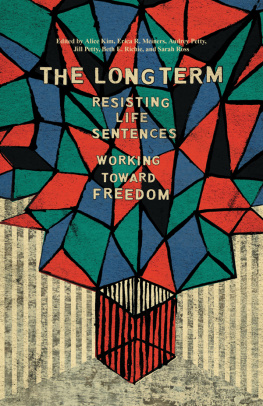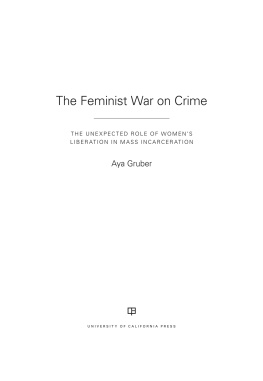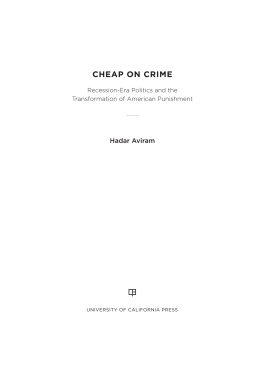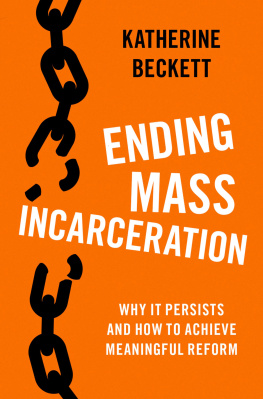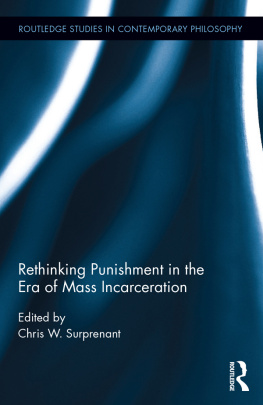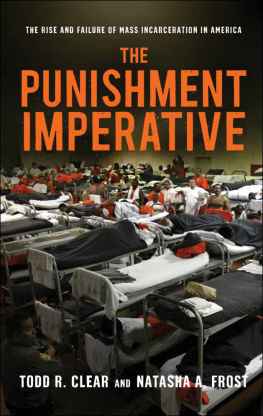Praise for The Long Term
The Long Term is a powerful collection of voices, curated and edited by a powerful lineup of veteran organizers and radical thinkers. The writers in this collection make a compelling and eloquent case against the prison nation and give us a glimpse of the resistance and the alternatives that are already in the works.
Barbara Ransby, author of Making All Black Lives Matter: Reimagining Freedom in the Twenty-First Century
As I read this book, I savor the words of s/heroes with whom Ive stood shoulder to shoulder in struggle and new voices that carry me to spirits and spaces that I now know deeply connect to my life and work. As the title tells us, captured lives inside and ongoing resistance are inexorably linked to struggles for freedom wherever we find them. This beautifully textured book offers so many entry points into stories of trauma that give rise to life-breathing resistance; solidarity even across bodily separation that fuels our collective creativity; and reasons not only for despair but for confidence in our combined vision and work. The freedom struggles reflected in the pages of this book and represented by its very publication offer us wisdom and inspiration to keep moving not only against oppression but onward in liberation.
Mimi Kim, PhD, School of Social Work, California State University, Long Beach and founder of TORCH, Training and Organizing Resources for Community Health
The essays collected in The Long Term address essential questions facing contemporary movements: What must be transformed and built to eliminate harm, cultivate strong communities, and create forms of authentic public safety? What are the levers and the mind-sets that make prisons and policing appear logical, necessary, and possible? This collection pulls together brilliant insights from writers inside and outside prisons, making critical insights and proposals about what it will take to get rid of police and prisons and build real safety and justice. This book is a must-read for anyone fighting against racism and criminalization. The Long Term is full of insightful, practical wisdom about how the punishment system is operating, what is fueling it, what reform attempts are inadvertently propping it up, and what kinds of work are actually necessary to abolish it. The Long Term is a bold and important contribution to feminist, anti-racist, and anti-punishment scholarship and activism.
Dean Spade, Associate Professor, Seattle University School of Law, and author of Normal Life: Administrative Violence, Critical Trans Politics, and the Limits of Law
The Long Term
Resisting Life Sentences, Working Toward Freedom
Edited by
Alice Kim, Erica R. Meiners, Audrey Petty,
Jill Petty, Beth E. Richie, and Sarah Ross
2018 Alice Kim, Erica R. Meiners, Audrey Petty, Jill Petty,
Beth E. Richie, Sarah Ross
Published in 2018 by
Haymarket Books
P.O. Box 180165
Chicago, IL 60618
773-583-7884
www.haymarketbooks.org
ISBN: 978-1-60846-900-0
Trade distribution:
In the US, Consortium Book Sales and Distribution, www.cbsd.com
In Canada, Publishers Group Canada, www.pgcbooks.ca
In the UK, Turnaround Publisher Services, www.turnaround-uk.com
All other countries, Ingram Publisher Services International,
Cover artwork by Damon Locks.
This book was published with the generous support of Lannan Foundation and Wallace Action Fund.
Library of Congress Cataloging-in-Publication data is available.

List of Images
Introduction
The Rise of Long-Term Sentences and Teaching Inside as Feminist, Abolitionist Labor
In 2011, when the Prison + Neighborhood Arts Project (P+NAP)a group of artists, scholars, organizers, and writersstarted teaching arts and humanities classes at Stateville prison in Illinois, our work was organized by the prison administration under a program called Long-Term Offenders. The abbreviation LTO, casually written on institutional paperwork and used by prison guards, is the prison administrations shorthand for people who are serving long-term sentences, meaning life without parole or virtual life sentences of fifty years or more. For the people we met in our classes at Stateville prison, the term LTO signals something profound: it represents the nations ideological and political commitments to the long-term removal of people from their communities into prisons, a label that condemns many to a continuously controlled life.
In this book we deploy the notion of the long term to show how the impacts of long-term sentencing extend beyond prison walls. The loss of family, community, and resources and the struggle against targeted criminalization are woven into the fabric of our everyday lives. Long-term sentencing is only the most blatant example of the prison nation, a term provided by activist, scholar, and coauthor Beth E. Richie.
Although Illinois successfully abolished the death penalty in 2011 after a decade-long moratorium on executions, students in our classes are still condemned to die in prison. They are among the nearly 206,000 people serving life or virtual life sentences in the United States, according to 2017 research from the national advocacy
This engineered pattern is evident throughout the nation. Reflecting the structural racism that is endemic to the criminal legal system, one in five Black people in prison in the United States is sentenced to virtual life or life sentences. Young people are not immune either: some twelve thousand people nationwide were sentenced to long terms as juveniles. Almost one-half of women serving life without parole are survivors of physical or sexual violence, illustrating the clear link between gender violence and state violence. The national advocacy organization Families Against Mandatory Minimums reports that people released from prison in 2009 served sentences that were, on average, more than a third longer than those of prisoners released in 1990. The tally is staggering, a consequence of the so-called tough-on-crime logic that powered the policies that lock people up and throw away the key.
This framework to restore law and order moved into the conservative lexicon in the 1960s to directly assault Black power and civil rights movements. From Richard Nixon, whose 1968 presidential campaign focused continually on crime and urban unrest, to Ronald Reagans war on drugs, to Bill Clintons 1994 crime bill, politicians across the political spectrum evoked the threat of crime to criminalize nonwhite, particularly Black, communities.
The shifting of financial resources away from education and into punishment and surveillance also holds true inside prisons, where resources for meaningful programming are scant. Not surprisingly, the rise of long-term sentences coincided with the loss of programs aimed at rehabilitation. The 1994 Violent Crime Control and Law Enforcement Act, the most expansive crime bill in the nations history, decimated higher education programs in prison by eliminating Pell Grants that provided federal financial aid for incarcerated students. As a result of this loss, approximately 350 secular college programs in prisons closed. Today, higher education programs inside are slowly being rebuilt through partnerships between colleges, nonprofits, and state departments of correction. This growth has coincided with increased public scrutiny on the problem of mass incarceration over the last decade.
Yet today, in many states, people with life sentences, those ineligible for parole, or those marked as gang-involved or who have convictions for sexual offenses are often placed at the back of the line for the limited educational or vocational opportunities that are In this same report, JHA noted that the Illinois Department of Corrections policy dictates that people with shorter sentences take available educational and vocational classes ahead of those with longer sentences, which effectively bars many people with long-term sentences from participating in programming.
Next page
